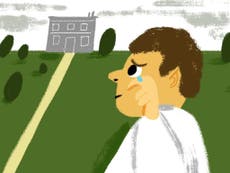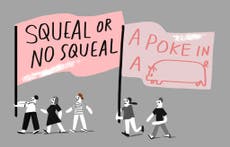Alzheimer's of the soul is a function of parenthood
Twenty years ago, Marcus Berkmann was pretty sure what he thought and felt about everything. Now he's not...

This is a good time of year for the party-loving, free-drink-worshipping freelance writer. There aren't as many parties as there used to be (or so people keep telling me) and nor are they quite as lavish McTavish as they might be, but for someone who essentially sits in one room for most of the year staring out of the window, I am grateful to be allowed out at all. By Christmas, I am hoping, the pallor of the imprisoned will have been replaced by the rubicund shine of the borderline alcoholic.
So, to a party last week, for a new political magazine, in a bookshop where, according to rumour, Grace Jones was signing books on the floor below. Ah, but was there red wine downstairs, or a copious supply of wagon-wheel-shaped potato snacks? We stayed where we were. In the course of a couple of hours, I successfully asked after one woman's newish baby but failed to recognise her husband, and then congratulated another woman on her wedding, which wasn't hers at all but someone else's. They are all much younger than me, thank God, and I think they take that into account.
As this was a political magazine, though, much of the chat was political, and I found that more of a struggle. Not that I don't keep up, because I do, diligently. But it's not enough merely to exchange information in such conversations, or show that you read more of a newspaper than the sports pages. You have to have opinions, and it was these, I found, that I was lacking. I have all the obvious ones I need for daily life: I know that George Osborne is wrong, and can explain why at hectoring length. But beyond the great certainties, what seem to have receded recently are the more subtle, nuanced certainties. Twenty years ago, I was pretty sure what I thought and felt about everything. Now I'm not.
Is this a function of age? I hope not, because the last thing you'd want is a sort of Alzheimer's of the soul, unable to decide whether or not Jeremy Corbyn was a good thing. But having given this some thought in the downtime between hangovers, I suspect that it's more a function of parenthood. Having children makes you realise that life is infinitely more complex and mysterious than you ever imagined, and pretty much unfathomable most of the time. Children present an unceasing sequence of quandaries, to which there are no obvious answers. Does it really matter whether they stay up another 15 minutes, or eat their brussels sprouts, or wear the blue top instead of the black top? Our parents tended to have firm views on everything, but that may have been because they saw decisiveness (ie, rigidity) as a strength and because they were too tired and irritable to argue about it.
People are supposed to get more pompous and rigid as they get older. But could this be a feint, a pose, to conceal the reality that they are getting less and less certain about everything, and don't want anyone to see it? Some of my older friends had very black-and-white responses to the horrors in Paris recently, but was this just because they didn't want to address the very much starker fact that they hadn't a clue what should be done? Do people find The Daily Mail's certainties comforting, because they take the place of the certainties they have lost? I have no idea. I'm uncertain even about my uncertainties. But at least I'm reasonably certain about that.






Join our commenting forum
Join thought-provoking conversations, follow other Independent readers and see their replies